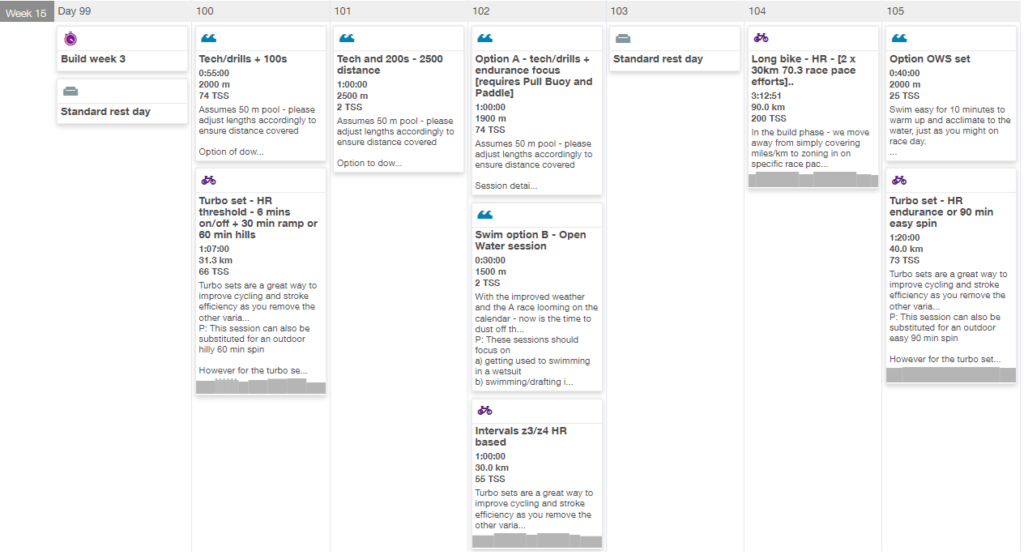Most triathletes are familiar with at least one of the following scenarios:
- You are rehabbing an injury that prevents you from running.
- You struggle to find the time to train for all three disciplines.
- You are a strong swimmer or cyclist but hate getting passed on the run.
- You are always up for a new multi-sport challenge!
If you can relate to any of the above, then aquabike could be the sport you’re looking for. Let’s dive into the basics of the sport, including its benefits and what to expect when training for an aquabike race.
What Is Aquabike?
It’s as simple as it sounds — you swim, transition, and then finish with a bike leg.
Just don’t forget to rack your bike and run over the finish line! That said, this type of race isn’t nearly as complex as your standard T2 in a triathlon, plus there’s no running to contend with.
Aquabike races are conducted in three distances:
- Olympic distance: 1-mile swim + 25-mile bike
- Half Ironman distance: 1.2-mile swim + 56-mile bike
- Ironman distance: 2.4-mile swim + 112-mile bike
Benefits of Aquabike Racing
The simplicity of aquabiking offers several distinct benefits from standard triathlons.
Less Impact
Eliminating the run element of training and racing can help avoid those troublesome knee/joint injuries that are all too often caused by pounding the pavement. This links back to scenario A (above) — aquabike racing is an excellent way to stay engaged in the sport if you’re recovering from an injury.
Less Training
I can hear the cogs turning in your head… two-thirds of the disciplines must mean two-thirds of the training! Well, yes and no.
If you’re struggling to find the time to train for all three triathlon disciplines, then training for an aquabike offers a simple way to eliminate all running training (hence resolving scenario B above). If time management is a major pain point for you, it might be worth learning how to better strategize your triathlon training.
However, if you want to be competitive in aquabike, you’ll essentially be substituting most of your old run sessions with swim/bike ones — which means you won’t be training any less.
Less Equipment
It’s true that you need less equipment for aquabike racing, but you’ll still be dishing out the dough, as wetsuits and bikes are much more expensive than any running gear!
Aquabike Training and Plans
Even with a lower commitment of “only” two sports, you will need to build up an aerobic level of fitness in your base period and then start getting more race-specific in your build phase. In this way, aquabike training is very similar to triathlon training, just sans running.
In terms of getting the most out of your aquabike training, are some useful hints and tips:
- DO mix up the training sessions to work on different muscle groups throughout your training day/week.
- DO have a mix of tech, speed and endurance swim sessions in your plan (the ratio of which will change from base to build).
- DO get a training plan. Below are two of my 70.3 training plans that are targeted at either beginner or advanced aquabike racers:
- DO expect to put in long miles on the bike. Remember that winter miles equal summer smiles (and PBs)!
- DO train to your weakness (and race to your strengths). For example, if you are a strong swimmer and an average cyclist, you need more work on the bike!
- DO have dedicated rest days and recovery weeks. Even without the impact of running load, your muscles and energy systems will thank you for it.
Here’s a sample training week during the base phase of an intermediate aquabike plan for the 70.3 distance.

Here’s a sample training week during the build phase of an intermediate aquabike plan for the 70.3 distance.

Finding Your First Aquabike Race
Whether you’re simply looking for a new challenge or want to keep competitive during a running hiatus, don’t overlook how much fun an aquabike race can be. More and more of these races are being held as their own distinct events or as a part of triathlon festivals.
To find your first one, check out your national federation website’s race calendars as the first port of call. Next, ask around your local tri community for options. If both those options fail, Google is always your friend!










